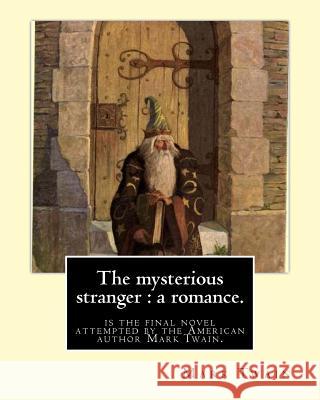The mysterious stranger: a romance. By: Mark Twain, illustrated By: N. C. Wyeth: The Mysterious Stranger is the final novel attempted by the Am » książka
The mysterious stranger: a romance. By: Mark Twain, illustrated By: N. C. Wyeth: The Mysterious Stranger is the final novel attempted by the Am
ISBN-13: 9781539959038 / Angielski / Miękka / 2016 / 70 str.
The mysterious stranger: a romance. By: Mark Twain, illustrated By: N. C. Wyeth: The Mysterious Stranger is the final novel attempted by the Am
ISBN-13: 9781539959038 / Angielski / Miękka / 2016 / 70 str.
(netto: 28,67 VAT: 5%)
Najniższa cena z 30 dni: 29,85
ok. 16-18 dni roboczych.
Darmowa dostawa!
The Mysterious Stranger is the final novel attempted by the American author Mark Twain. He worked on it periodically from 1897 through 1908. The body of work is a serious social commentary by Twain addressing his ideas of the Moral Sense and the "damned human race." Newell Convers Wyeth (October 22, 1882 - October 19, 1945), known as N. C. Wyeth, was an American artist and illustrator. He was the pupil of artist Howard Pyle and became one of America's greatest illustrators. During his lifetime, Wyeth created over 3,000 paintings and illustrated 112 books, 25 of them for Scribner's, the Scribner Classics, which is the work for which he is best known.... Samuel Langhorne Clemens (November 30, 1835 - April 21, 1910), better known by his pen name Mark Twain, was an American writer, entrepreneur, publisher and lecturer. Among his novels are The Adventures of Tom Sawyer (1876) and its sequel, Adventures of Huckleberry Finn (1885), the latter often called "The Great American Novel." Twain was raised in Hannibal, Missouri, which later provided the setting for Tom Sawyer and Huckleberry Finn. After an apprenticeship with a printer, Twain worked as a typesetter and contributed articles to the newspaper of his older brother, Orion Clemens. He later became a riverboat pilot on the Mississippi River before heading west to join Orion in Nevada. He referred humorously to his lack of success at mining, turning to journalism for the Virginia City Territorial Enterprise.In 1865, his humorous story "The Celebrated Jumping Frog of Calaveras County" was published, based on a story he heard at Angels Hotel in Angels Camp, California, where he had spent some time as a miner. The short story brought international attention, and was even translated into classic Greek.His wit and satire, in prose and in speech, earned praise from critics and peers, and he was a friend to presidents, artists, industrialists, and European royalty.Though Twain earned a great deal of money from his writings and lectures, he invested in ventures that lost a great deal of money, notably the Paige Compositor, a mechanical typesetter, which failed because of its complexity and imprecision. In the wake of these financial setbacks, he filed for protection from his creditors via bankruptcy, and with the help of Henry Huttleston Rogers eventually overcame his financial troubles. Twain chose to pay all his pre-bankruptcy creditors in full, though he had no legal responsibility to do so.
Zawartość książki może nie spełniać oczekiwań – reklamacje nie obejmują treści, która mogła nie być redakcyjnie ani merytorycznie opracowana.











